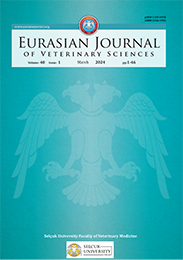| 2021, Cilt 37, Sayı 1, Sayfa(lar) 016-024 | |
| [ Özet ] [ PDF ] [ Benzer Makaleler ] [ Yazara E-Posta ] [ Editöre E-Posta ] | |
| The importance of venous blood gas findings and clinical scores in calves with bovine respiratory disease complex | |
| Merve İder, Mehmet Maden | |
| Selçuk Üniversitesi Veteriner Fakültesi İç Hastalıkları Anabilim Dalı, Konya, Türkiye | |
| Keywords: Blood gases, clinical score, pneumonia, calf | |
| Abstract | |
Aim: The aim of this study was to determine the effects of bacteriological
factors in the etiology of Bovine Respiratory Disease Complex (BRD) on
the clinical scores and blood gases. Materials and Methods: The animal material of the study consisted of 28 calves with BRD (experimental group) and 10 healthy calves (control group), aged between 60-120 days. Calves with BRD were divided into three sub-groups depending on the microbiological examination of the bronchoalveolar lavage fluid; Mannheimia haemolytica (n:6), Pasteurella multocida (n:10) and Mycoplasma bovis (n:12). All calves were scored based on the Wisconsin (WI) score system. Blood gases were measured in venous blood samples. Results: All clinical scores were found to be higher (p <0.05) in the experimental group compared to the control group. The clinical course of the disease was found to be more severe in M. haemolytica and P. multocida groups than in the M. bovis group (p <0.05). In all experimental groups, pCO2 level was high, the pO2 and sO2 levels were low (p<0.05). Cl level was lower and HCO3 level was higher (p <0.05) in P. multocida group compared to control and M. haemolytica groups, BEefc and BE levels were found to be higher (p <0.05) in P. multocida group compared to all groups. Conclusion: It was concluded that changes in blood gases and acid-base balance in BRD calves are associated with metabolic compensation of respiratory problems, and according to the clinical scores, M. haemolytica and P. multocida infections had a more severe course. |
|
| [ Başa Dön ] [ Özet ] [ PDF ] [ Benzer Makaleler ] [ Yazara E-Posta ] [ Editöre E-Posta ] | |




